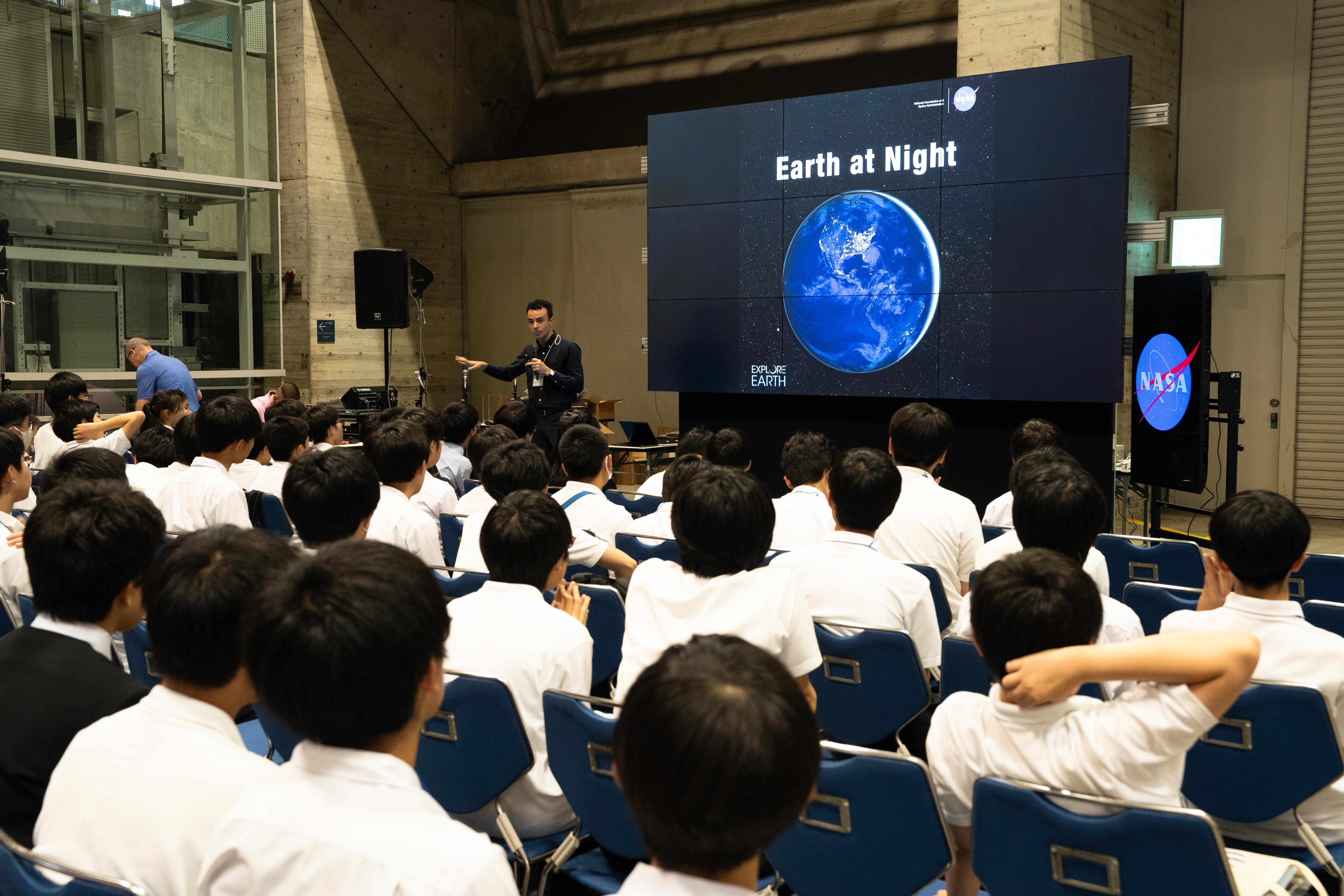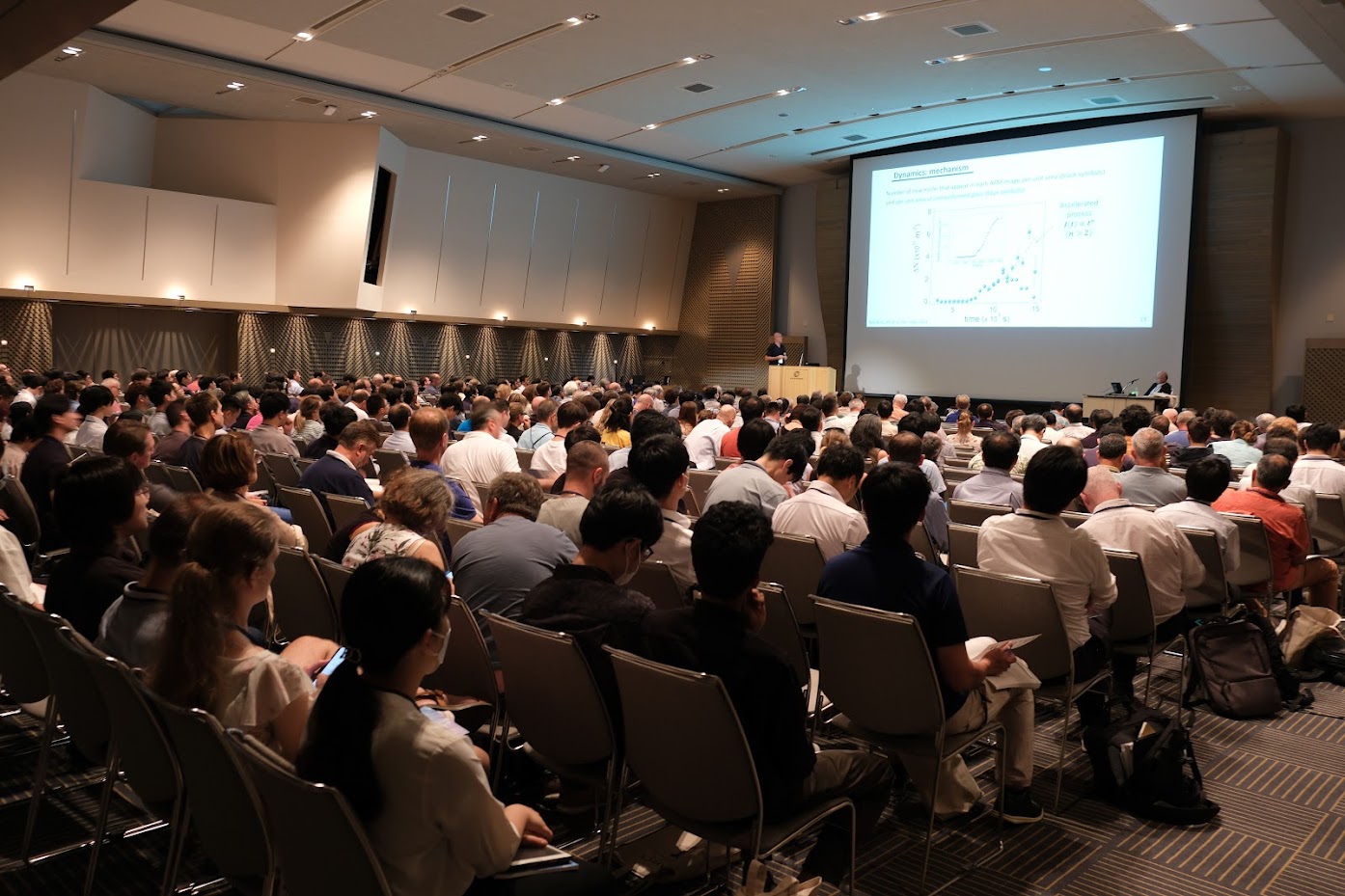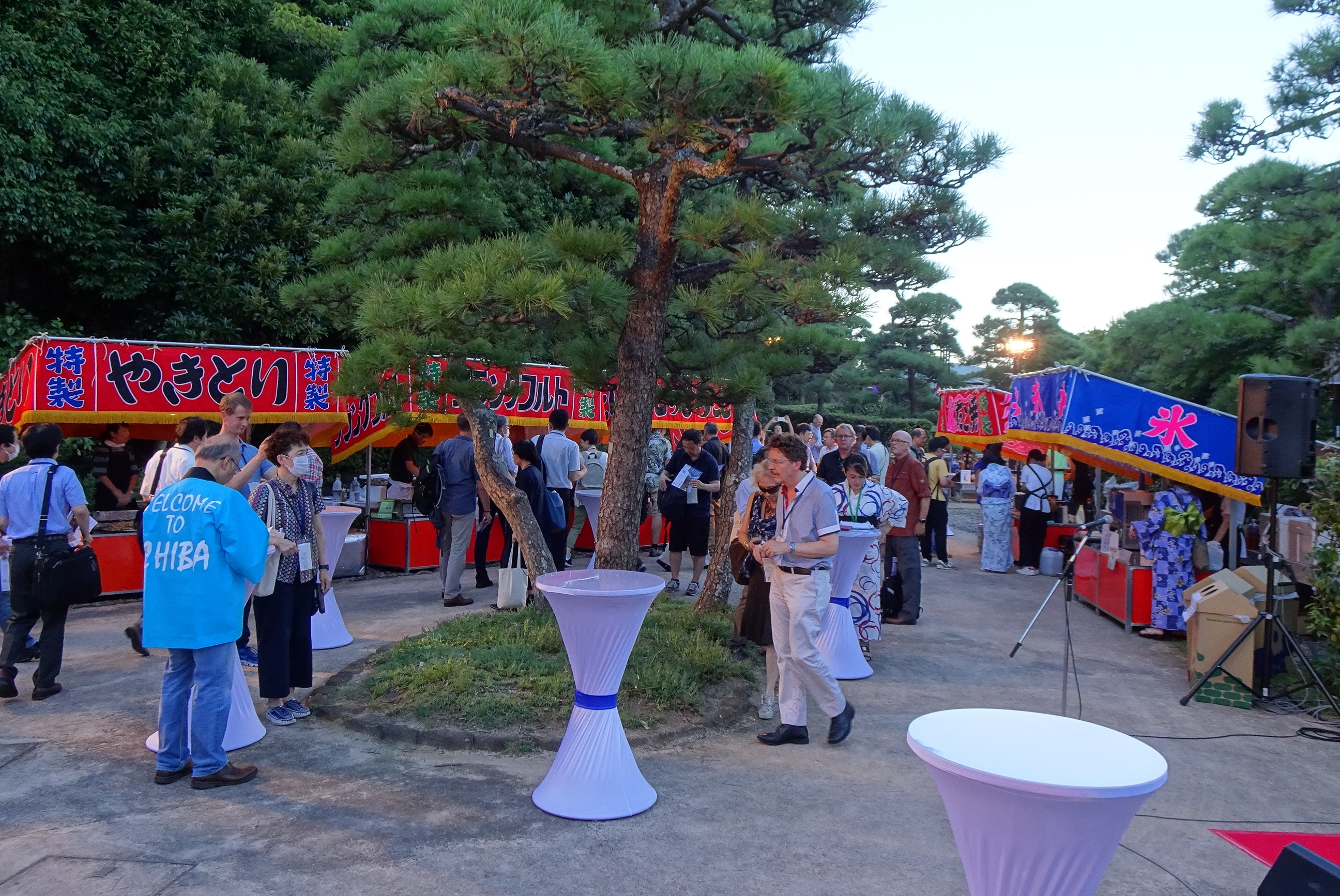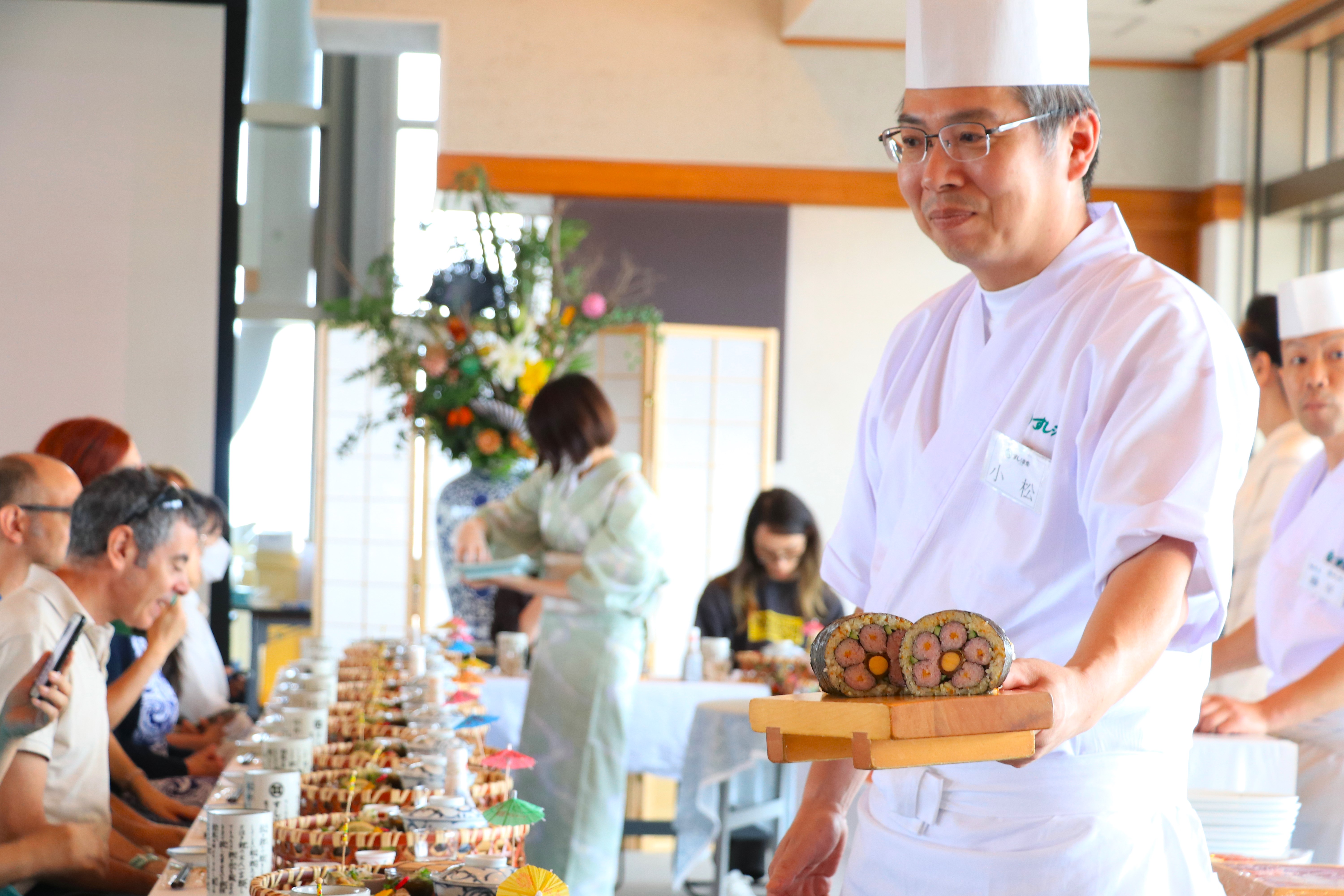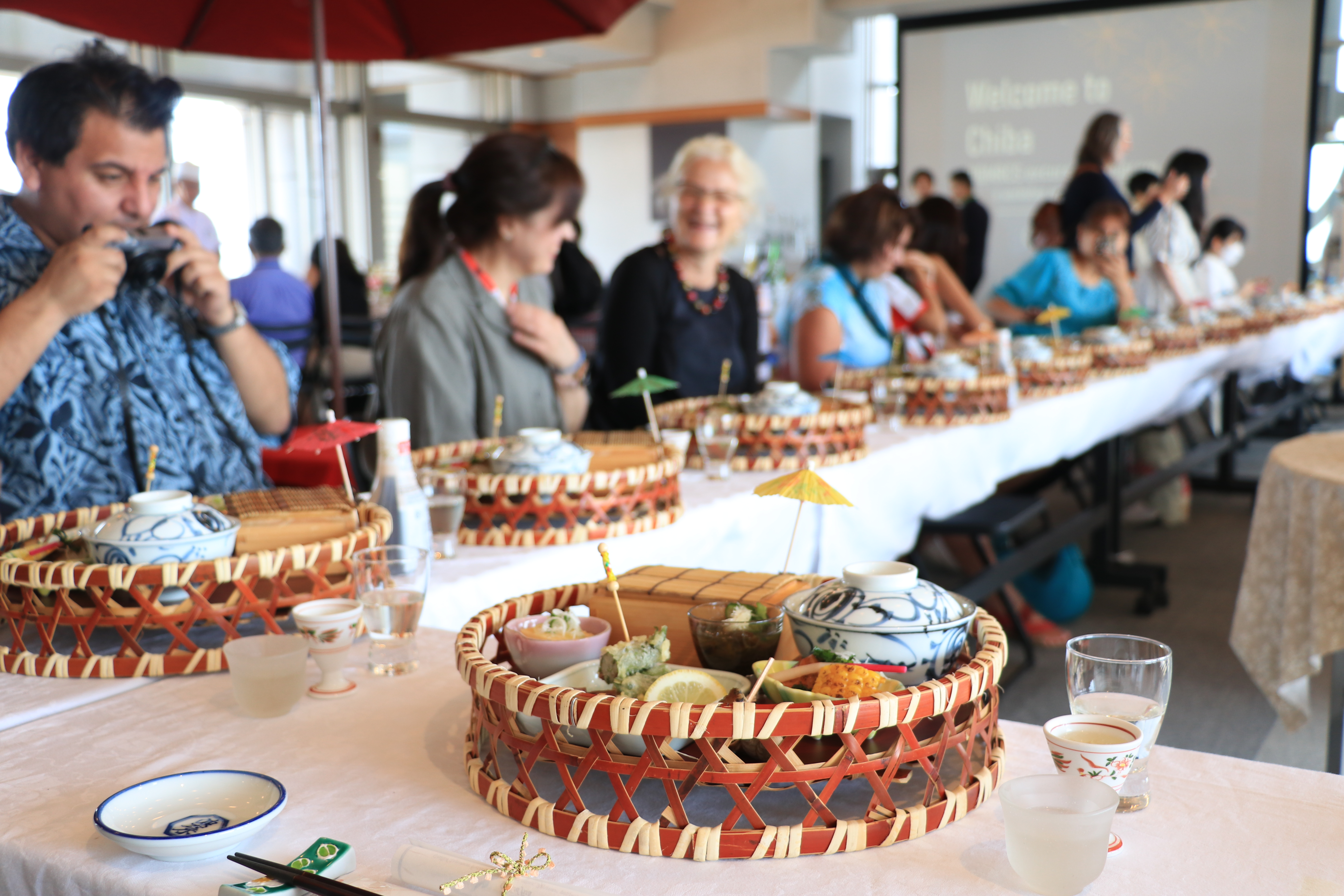9th International Discussion Meeting on Relaxation in Complex Systems(9IDMRCS)
| Case | 9th International Meeting on Relaxations in Complex Systems (9IDMRCS) |
| Organizer | Prof. Osamu Yamamuro, The Institute for Solid State Physics , The University of Tokyo |
| Venue | Makuhari Messe (Chiba, Japan) |
| Period of event | August 12 (Sat.) - 18 (Fri.), 2023 (7 days) |
| Number of countries | 39 |
| Number of participants | 621 (including 357 from overseas) *Online participation by 115 people |
| Convention overview | ・This is an international physics conference where experts from around the world gather to present their cutting-edge research results. Sessions were organized for researchers in the fields of physics, chemistry, biology, glass, new materials, and pharmaceuticals (especially in the area of structure and relaxation phenomena of materials) to present their research results. ・The first event was held in Crete, Greece in 1990. Since then, the event has been held once every four years, and this year's Chiba convention was the first to be held outside of Europe. ・The event was originally scheduled to be held in July 2021, but due to the COVID-19 pandemic, it was rescheduled for July 2022. However, due to the fact that the conclusion of the COVID-19 pandemic lasted longer than expected and the number of foreign participants could not be expected, the date was rescheduled to August 2023. |
| CCB Support Contents | ・Planning and operation of unique venues for banquets utilizing Mihamaen (*) ・Planning and operation of excursions ・Planning and operation of companion programs at the Chiba City Museum of Art (*) (Sushi performance program by a sushi chef in the museum, Ukiyo-e print workshop, language volunteer arrangements, etc.) ・Support for public relations activities (press releases, SNS, etc.) ・Arrangement of university volunteers at the conference venue ・Tour desk set up at the conference venue ・Subsidies for holding international conferences in Chiba Prefecture and CCB Loan (*)Project adopted by the Japan Tourism Agency's “Project to Improve the Competitiveness of Attracting International Conferences for the Post-Corona Period”. |
■Realization of the first conference to be held in Japan - Received the Japan National Tourism Organization (JNTO) “2019 International Conference Attraction and Hosting Contribution Award” (in the category of attracting international conferences)
This is the first time that a conference that had previously been held in Europe has been successfully brought to Japan from outside Europe.
When the momentum to hold the conference outside Europe first gained momentum, Japanese universities and research groups were quick to lobby Japan and succeeded in gaining the trust of key persons. In addition, the Chiba Convention Bureau and Makuhari Messe, the venue of the conference, worked together to attract the convention to Chiba, and the decision to hold the conference in Chiba was based on their highly regarded proposal of detailed services that could not be realized in competing cities.
The conference was hosted by a research institute in Kashiwa City and held in Chiba City, both cities with diverse industries, academic research institutions, and high-level intellectual human resources, and was selected by the Japan National Tourism Organization (JNTO) as the winner of the “2019 International Conference Attraction and Hosting Contribution Award*” (in the Attraction Category). The project was selected by the Japan National Tourism Organization (JNTO) to receive the “2019 International Conference Attraction and Hosting Contribution Award*” (in the category of attracting international conferences).
The conference, which was finally held after three years of repeated postponements due to the COVID-19 pandemic, provided an opportunity to fully publicize Chiba's attractions to the participants in accordance with the conference chair's wishes, and at the same time, together with the people involved, to enhance the value, characteristics, and further appeal of the region as a project that will lead to the future.
(*)JNTO-sponsored “Award for Contribution to Attracting and Hosting International Conferences”: This award has two categories: “Attracting” and “Hosting,” and is given annually to international conferences that are good examples of how to attract and host conferences and how to contribute to the local community.
When the momentum to hold the conference outside Europe first gained momentum, Japanese universities and research groups were quick to lobby Japan and succeeded in gaining the trust of key persons. In addition, the Chiba Convention Bureau and Makuhari Messe, the venue of the conference, worked together to attract the convention to Chiba, and the decision to hold the conference in Chiba was based on their highly regarded proposal of detailed services that could not be realized in competing cities.
The conference was hosted by a research institute in Kashiwa City and held in Chiba City, both cities with diverse industries, academic research institutions, and high-level intellectual human resources, and was selected by the Japan National Tourism Organization (JNTO) as the winner of the “2019 International Conference Attraction and Hosting Contribution Award*” (in the Attraction Category). The project was selected by the Japan National Tourism Organization (JNTO) to receive the “2019 International Conference Attraction and Hosting Contribution Award*” (in the category of attracting international conferences).
The conference, which was finally held after three years of repeated postponements due to the COVID-19 pandemic, provided an opportunity to fully publicize Chiba's attractions to the participants in accordance with the conference chair's wishes, and at the same time, together with the people involved, to enhance the value, characteristics, and further appeal of the region as a project that will lead to the future.
(*)JNTO-sponsored “Award for Contribution to Attracting and Hosting International Conferences”: This award has two categories: “Attracting” and “Hosting,” and is given annually to international conferences that are good examples of how to attract and host conferences and how to contribute to the local community.
■Adopted for the “Project to Improve the Competitiveness of Attracting International Conferences for the Post-Corona Period” sponsored by the Japan Tourism Agency
The project was selected to demonstrate an international conference program aimed at “increasing the economic impact of the conference by increasing the number of local participants and per capita consumption,” “creating further attractiveness of the host city through wide-area collaboration beyond the boundaries of local governments,” and “creating a legacy by promoting collaboration and participation by host city stakeholders” through the implementation of programs such as excursions, technical visits, regional participation programs, and utilization of unique venues associated with international conferences, which was difficult to implement due to the decrease in infectious disease control and the number of participants.
■Japanese Garden Banquet with an image of a summer festival - Practicing local production for local consumption and SDGs
The banquet was held as Unique Venue's first attempt to utilize the entire garden of Mihamaen, a Japanese garden located a five-minute walk from Makuhari Messe. Led by the CCB, and with the support of Chiba Prefecture, which owns the garden, and Chiba City, which manages the garden, a banquet was held for 300 people, inspired by a Japanese “summer festival.
The main events held at Mihamaen were tea ceremonies in the tearoom to experience Japanese culture, or dinner parties for small groups of people. In utilizing the entire garden as a party venue, we received the understanding and support of local officials, who hoped that this would lead to the revitalization of the local community and the utilization of the facilities.
The party was inspired by a “summer festival” to experience Japanese culture, with food stalls and fair events. The fair items included many goods related to Chiba, as well as locally brewed beer and locally produced, locally consumed food to make people feel as if they were in the host city, Chiba. At the party, which was open to all, participants enjoyed the festival in their own ways, including eating grilled corn and playing target practice.
In the fantastic Japanese garden lit up with lights, maiko (apprentice geisha) were welcomed and shamisen (three-stringed Japanese instrument) performances were held to enliven the venue and give it a Japanese feel. Participants expressed their high level of satisfaction with the party as a whole, including the location, the food, the performance, and the fantastic atmosphere.
In addition, local volunteers were appointed both inside and outside the conference venue to create opportunities for interaction with the local community. New initiatives were implemented, including the use of pictograms to indicate ingredients for banquet food, extensive use of recyclable tableware, and the use of environmentally friendly bottled beverages as a new initiative to raise awareness of the SDGs.
The main events held at Mihamaen were tea ceremonies in the tearoom to experience Japanese culture, or dinner parties for small groups of people. In utilizing the entire garden as a party venue, we received the understanding and support of local officials, who hoped that this would lead to the revitalization of the local community and the utilization of the facilities.
The party was inspired by a “summer festival” to experience Japanese culture, with food stalls and fair events. The fair items included many goods related to Chiba, as well as locally brewed beer and locally produced, locally consumed food to make people feel as if they were in the host city, Chiba. At the party, which was open to all, participants enjoyed the festival in their own ways, including eating grilled corn and playing target practice.
In the fantastic Japanese garden lit up with lights, maiko (apprentice geisha) were welcomed and shamisen (three-stringed Japanese instrument) performances were held to enliven the venue and give it a Japanese feel. Participants expressed their high level of satisfaction with the party as a whole, including the location, the food, the performance, and the fantastic atmosphere.
In addition, local volunteers were appointed both inside and outside the conference venue to create opportunities for interaction with the local community. New initiatives were implemented, including the use of pictograms to indicate ingredients for banquet food, extensive use of recyclable tableware, and the use of environmentally friendly bottled beverages as a new initiative to raise awareness of the SDGs.
■Excursions with bilingual experience program
As part of the excursion for conference participants, the Chiba City Museum of Art was used as a lunchvenue. During the lunch, sushi chefs demonstrated their Japanese skills by making futomaki-zushi, a Boso local cuisine, and Edomae-zushi, an Edo-style sushi, in front of the participants.
Participants commented that it was the most beautiful food they had ever seen, and that the videos on the history of sushi and the making of futomaki sushi were very interesting. Many participants also expressed interest in Chiba's local sake and souvenirs after attending this program, and many inquired about places to purchase them.
The Chiba City Museum of Art, famous for its Ukiyo-e prints, held a workshop on printmaking, a traditional Japanese technique, in addition to viewing Ukiyo-e prints. In addition, a welcome lecture by the museum director and explanations of Ukiyo-e by the curators helped the visitors to develop a deeper interest in prints, and to take advantage of the unique features of the Chiba City Museum of Art.
In addition to this excursion, we offered four other excursions at this year's conference, all of which were accompanied by our staff and English-speaking volunteers to support participants. CCB also provided support for advance preparations, such as preparing flyers with English translations for those areas where English was not widely used, and distributing them to participants.
While previous excursions have focused on introducing famous sightseeing spots and facilities in the prefecture, this time we realized once again that participants were highly interested in the history and traditional crafts rooted in the area. We also learned that learning about various histories and backgrounds in English and actually experiencing them themselves leads to a very high level of satisfaction, which we need to keep in mind in our future activities to attract visitors.
Participants commented that it was the most beautiful food they had ever seen, and that the videos on the history of sushi and the making of futomaki sushi were very interesting. Many participants also expressed interest in Chiba's local sake and souvenirs after attending this program, and many inquired about places to purchase them.
The Chiba City Museum of Art, famous for its Ukiyo-e prints, held a workshop on printmaking, a traditional Japanese technique, in addition to viewing Ukiyo-e prints. In addition, a welcome lecture by the museum director and explanations of Ukiyo-e by the curators helped the visitors to develop a deeper interest in prints, and to take advantage of the unique features of the Chiba City Museum of Art.
In addition to this excursion, we offered four other excursions at this year's conference, all of which were accompanied by our staff and English-speaking volunteers to support participants. CCB also provided support for advance preparations, such as preparing flyers with English translations for those areas where English was not widely used, and distributing them to participants.
While previous excursions have focused on introducing famous sightseeing spots and facilities in the prefecture, this time we realized once again that participants were highly interested in the history and traditional crafts rooted in the area. We also learned that learning about various histories and backgrounds in English and actually experiencing them themselves leads to a very high level of satisfaction, which we need to keep in mind in our future activities to attract visitors.
■Message from Prof. Yamamuro (Conference Chair) at the 2023 Chiba MICE Day (excerpt)
There were many factors that contributed to the success of the conference, but Team Chiba's contributions included
・The integration of the venue, management, hotel reservations, social programs, etc. by Makuhari Messe and CCB
Obtaining numerous subsidies (from Chiba Prefecture, Chiba City, Japan Tourism Agency, and sponsors)
・Securing enough staff, part-time students, and teamwork on the day of the conference
・The diversity, uniqueness, and quality of the social program (especially the Mihamaen banquet)
We were very pleased with these aspects of the conference.
We would like to express our sincere gratitude to Makuhari Messe and Chiba Convention Bureau for their excellent support in the overall operation of the conference, and to Chiba Prefecture, Chiba City, the Japan Tourism Agency, and all the sponsors for their generous financial support.
・The integration of the venue, management, hotel reservations, social programs, etc. by Makuhari Messe and CCB
Obtaining numerous subsidies (from Chiba Prefecture, Chiba City, Japan Tourism Agency, and sponsors)
・Securing enough staff, part-time students, and teamwork on the day of the conference
・The diversity, uniqueness, and quality of the social program (especially the Mihamaen banquet)
We were very pleased with these aspects of the conference.
We would like to express our sincere gratitude to Makuhari Messe and Chiba Convention Bureau for their excellent support in the overall operation of the conference, and to Chiba Prefecture, Chiba City, the Japan Tourism Agency, and all the sponsors for their generous financial support.
■Pictures

